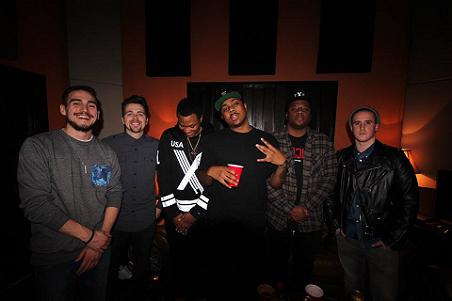There’s been a lot of talk over the last year or so about Portland’s rap scene. The meteoric rise of Macklemore brought national hip-hop media attention to the Great Northwest, while the silver screen sold it’s own fanciful images of Portland through popular programming like Portlandia, Grimm, and Leverage. But the coverage didn’t stop there… Portland continued to make national news for a variety of topics that didn’t include strippers, livability, beer or bicycles. National reports covered Portland as America’s whitest large city, the Clackamas Mall shooting, a federal probe exposing rights violations in the police force, and the NE section of the city getting embroiled in the national gentrification debate including PAALF’s successful derailment of a city council plan to subsidize a Trader Joe’s.
Amongst all of this, Vice Magazine’s now infamous Portland Has A Hip-Hop Problem aired some of Portland hip-hop’s “dirty laundry”, leaving a nasty taste in the mouths of many local artists. Willamette Week captured the thoughts of a few local artists and wrote a response which, if nothing else, generated some comment-section gold. Make no mistake, making it in hip-hop is difficult to do anywhere; in Portland, the chances of being a successful rap artist – by any definition of success – are daunting at best. But that’s what makes our scene so particularly competitive.

(via itstope.com)
The beauty of this (mostly negative) attention is that artists in the city responded by turning their collective aim from each other to those people “out there” who might attempt to define our culture or put us in a box. More than ever, artists are quality checking each other, collaborating, and sharing resources to put each other on. Making “The Town” look bad is unacceptable, and people are holding each other accountable. Walls between cliques are breaking down quickly and rappers are expanding their demographic range. Veteran rap group Lifesavas co-signed young rap group TxE. Producers Stewart Villain and Trox are connecting dots around the country. Seattle’s Moor Gang artists have been collaborating with Oregon artists like Cassow, Cory Kendrix, and T Soprano.
So what changed? I was recently invited to a session at Flatline Studios where Alexander Devine and Co. put together CypherPDX, a collaborative effort in which rappers from different sects of the scene delivered over a mesmerizing loop played by a live band, The Wishermen. Ironically, Devine’s last attempt to put together a PDX cipher resulted in some fragmentation. This time around, we’re hoping nobody takes exception.
When I arrived at Flatline, Dre C, Stewart Villain, Epp and PropaneLV were writing verses for the song – to be honest – Epp was not writing anything. He just sat around talking and cracking jokes, but when it came time to rap, he was the most ready. It was wild to see the different processes folks take. While Dre C and Stew penned verses rather quickly, kicking it and editing as the band prepared, Propane was completely zoned out in a corner, intensely focused on placing every word in the right position. Watching the makeshift team learn from one another and adapt to each other’s idiosyncrasies (these are artists) was inspiring. Hearing the artists make plans and exchange resources was exciting. And the result was solid.
All this to say, Portland’s rap scene is as exposed as it’s ever been and artists from all sectors of this amazingly deep talent pool are taking advantage of the shine. It seems that the days of trying to hold each other back are being replaced by the days of putting each other on as the sudden onset of national attention has the hip-hop community looking to show up, show out, and show the world what we have to offer.
All eyes on us. Don’t get left behind.
~Smitty

